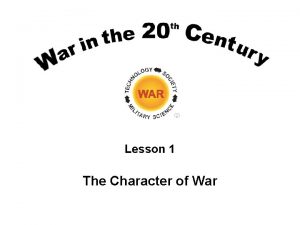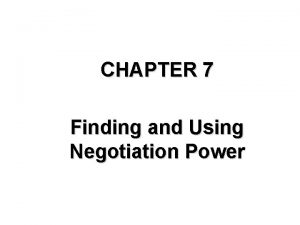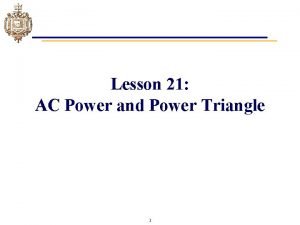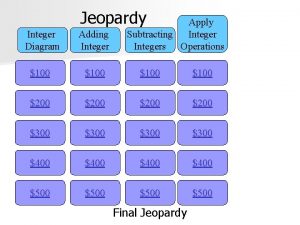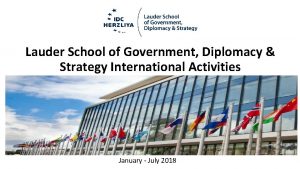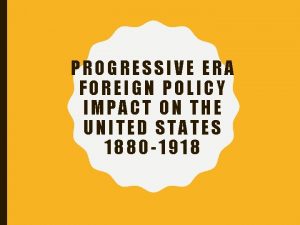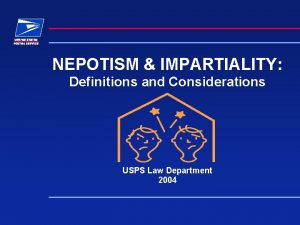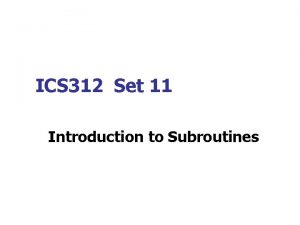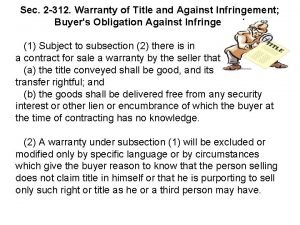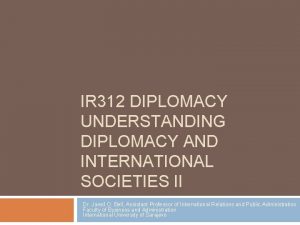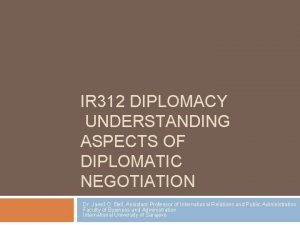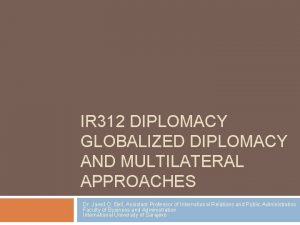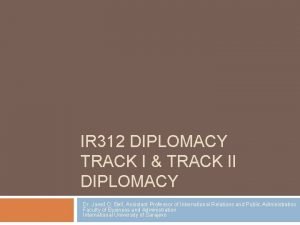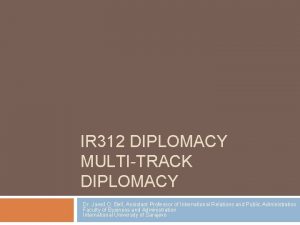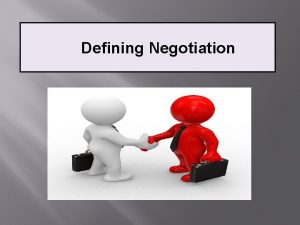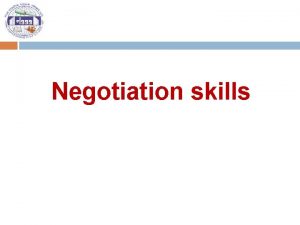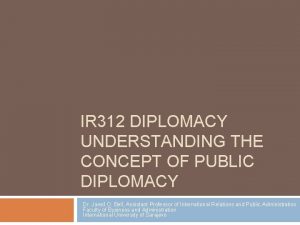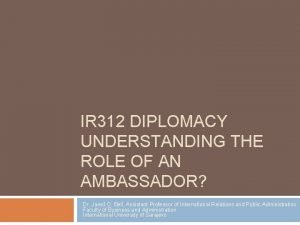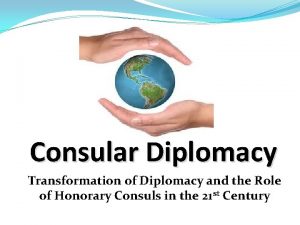IR 312 DIPLOMACY UNDERSTANDING NEGOTIATION AND POWER IN




















- Slides: 20

IR 312 DIPLOMACY UNDERSTANDING NEGOTIATION AND POWER IN DIPLOMACY Dr. Jared O. Bell, Assistant Professor of International Relations and Public Administration Faculty of Business and Administration International University of Sarajevo

What are Diplomatic Negotiations What do you think Diplomatic Negotiations entail?

Understanding the Importance of Diplomatic Negotiations Diplomatic negotiation processes are vital instruments in international relations between countries and in international organizations. In article 33. 1 of Chapter VI of the Charter of the United Nations, concerning the ‘Pacific Settlement of Disputes’, negotiation is mentioned as the first instrument of seven methods to be used in cases of conflict.

Defining Negotiation How Can we define negotiation and then how do we define diplomatic negotiation?

How can we define Negotiation? The definition of diplomatic/international negotiation depends on the question of which definition is most suitable to describe and analyze the process as an explanation of its outcome. Maxim Kaplan (Kaplan, 2010: 13) found 161 different definitions of negotiation. In 115 of these, agreement is the issue that these definitions want to clarify, 71 definitions stress communication as the main factor to be analyzed, 64 focus on conflicting interests, and another 64 perceive negotiation from the point of view of elements such as process and behavior. Christer Jönsson and Martin Hall, for example, do not attempt to define diplomatic negotiation at all. They just try to approach its meaning, by saying that ‘While negotiating to further the interests of their particular polities, diplomats typically identify the peaceful resolution of conflicts and the avoidance of war as common interests’ (Jönsson and Hall, 2005: 82). They stress the fact that diplomats are negotiating as ‘agents of a principal with ultimate authority’ (Jönsson and Hall, 2005: 84).

How can we define Negotiation? (Cont. ) Henry Kissinger views negotiation thus: ‘In simple terms, negotiation is a process of combining conflicting positions into a common position, under a decision rule of unanimity, a phenomenon in which the outcome is determined by the process’

How negotiation can be used Negotiation can be used to avoid wars, and it is nearly always used after wars are over. Negotiation can be used to make deals and agreements Negotiation can be used to form alliances What else can negotiation be used for?

Benefits of Negotiation is a cost effective mechanism aspiring to create peace, creating a secure environment for that peace to flourish, and establishing sustainability through the implementation of justice. It is, of course, a question of interrelationships.

Who Conducts Negotiations? Negotiation Between two states in particular are conducted between representatives. These state representatives can be divided into two categories: politicians; and diplomats/civil servants. Consequently, negotiations between states can be held either on a political or on a diplomatic/official level. The political level is the highest level and mostly preceded and followed by diplomatic/official consultations. The category of diplomats and civil servants can also be subdivided, depending on the question of whether an ambassador/ director-general, a young diplomat/policy adviser, or someone in between these ranks, is conducting the negotiations

Things to be considered The actors appear at the negotiation table from different positions. Apart from the interests that they have to consider, one can assume that one negotiator will be more skilled than the other, will have a better knowledge of his or her dossier, is more motivated, better trained and could have more credit within his delegation, ministry or government than the other. Human differences will influence the course of the negotiations, not in the sense that they would be the most influencing factor on their own, but at decisive moments they can tip the balance. The more the other factors (that influence the negotiation process) are balanced against each other, the greater the margins in which the negotiator’s personal characteristics will play a role.

Influences on the way a country negotiates? What are some factors that might influence the way a country might negotiate?

Factors of Negotiation (Cont. ) The factors influencing this process are so numerous that a thorough understanding of the actual proceedings is almost impossible. Diplomatic Negotiation it was pointed out that the negotiators, with their own characteristics and circumstances, have a certain influence, but that the real determining factor does not rest with them but is ingrained in the power of the countries that they represent, or, in other words, in the power structure, the measure of asymmetry.

Factors (Cont. ) Culture Socio-economic status Position in the negotiation ( what do they have to offer) Incentives Personal style and experience of diplomats involved

Negotiations and Power The question of the direction in which the negotiation process is moving is therefore predominantly a question of power, at least in inter-state negotiation processes. It is interesting to note here that negotiation processes between equal powers are as a rule not very effective. Some power difference is needed in order to get the negotiation process to flow.

(Negotiations and Power (Cont. ) Power can be distinguished in three components: power that is marginal and originates from the negotiator (power of conduct); power of the state being represented (structural power); and power that belongs to the state regarding the issues being negotiated (comparative power).

When do Negotiations take place? The readiness of actors to be involved in the process depends on their interests. Negotiations will only take place when the parties, in one way or another, actually need each other. A relationship should exist between (parts of) the parties’ interests. It is very important for the negotiator to know to what extent the interests of both parties run parallel, or whether they largely exclude each other.

When will negotiations take place? (Cont. ) Negotiations will also take place in a situation where interests practically converge with reasons to cooperate (the lower limit), or when the interests do not converge but enough reasons exist for consultation (the upper limit). Outside these limits, there is no question of negotiating but instead of conflict or staying aloof.

Structural Power, States, and Negotiations Structural power involves the total of power factors that are available to a country in relation to that of other nations. This power is determined by issues such as the size and location (for example, a strategic position) of the territory or state the nature of its borders, its inhabitants, the presence of natural resources its economic structure the level of technological development, its financial power ethnic diversity of its population social homogeneity, the stability of its political system (that is, how legitimate is the government? ) and the nature of its people (whatever that may be, and whether it exists at all).

Phases of a Negotiation Process A negotiation process means going through various phases: preparation and diagnosis Information searching formulations bargaining the drafting of all the details (Dupont and Faure, 1991).

When Can Parties Reach a Settlement The way in which parties reach a settlement can also be divided into three categories. In the first place, there is the procedure whereby parties would like to see what is, for them, the all-important points included in the settlement: First, the synthesis of interests. A synthesis is often difficult to reach and even more difficult to implement. Second, there is the synergy of interests, when one tries to work not from a partial interest, but from a mutual interest. These kinds of results can be very satisfying, and can be well implemented. However, requirements include a very good atmosphere during the negotiations, and lots of time. Third, there are compromise and compensation. Compromise comes in the form of mutual concessions, in which each party loses some points and wins some, or in which parties compensate each other for their losses by trading concessions (‘package deals’).
 Lesson 3 new american diplomacy
Lesson 3 new american diplomacy What is the operational level of war
What is the operational level of war Finding and using negotiation power
Finding and using negotiation power Real power and reactive power
Real power and reactive power What is the difference between 29 028 and 1 312
What is the difference between 29 028 and 1 312 Katherine is very interested in cryogenics
Katherine is very interested in cryogenics Lauder school of government diplomacy and strategy
Lauder school of government diplomacy and strategy Lauder school of government diplomacy and strategy
Lauder school of government diplomacy and strategy Progressive era foreign policy
Progressive era foreign policy Cse 312
Cse 312 123+132+321+312
123+132+321+312 Nepotism usps
Nepotism usps Ics 312
Ics 312 Cse 312
Cse 312 Natural hazards definition ap human geography
Natural hazards definition ap human geography Java 8 312
Java 8 312 Po box 30512 salt lake city
Po box 30512 salt lake city Cse 332 uw
Cse 332 uw Oposthotonus
Oposthotonus Altivar 312 solar
Altivar 312 solar 2-312
2-312

